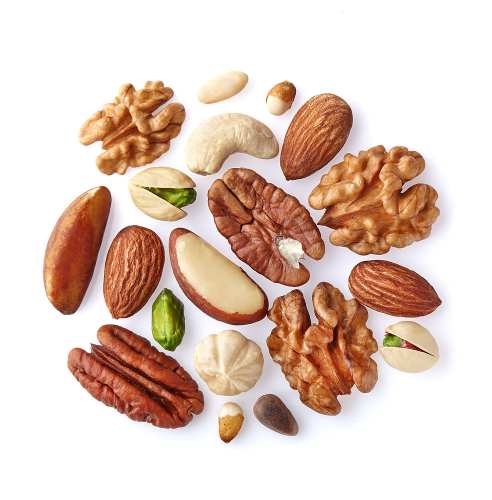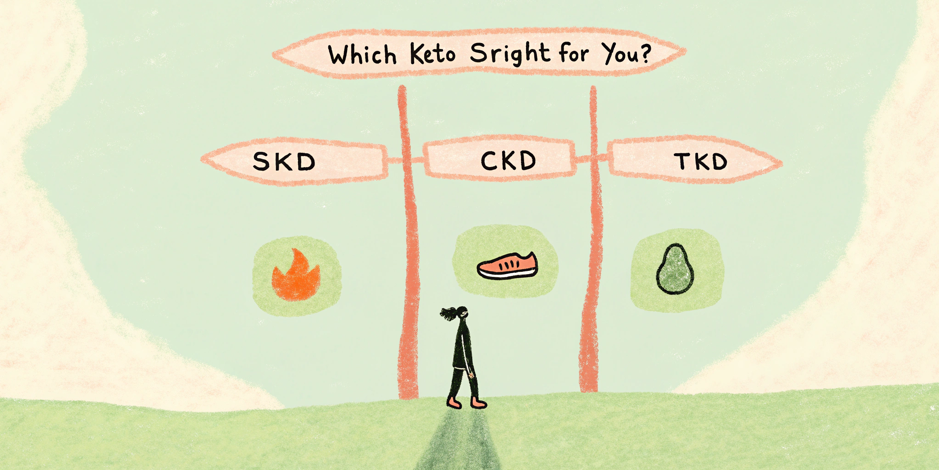Overview of Different Types of Keto Diets (SKD, CKD, TKD) and Who Might Benefit from Each
The ketogenic diet (keto) has gained immense popularity for its weight loss, metabolic health, and cognitive benefits. However, not all keto diets are the same. Different variations exist to cater to different lifestyles, fitness levels, and dietary needs.
This guide explores the three main types of ketogenic diets—Standard Ketogenic Diet (SKD), Cyclical Ketogenic Diet (CKD), and Targeted Ketogenic Diet (TKD)—and explains who might benefit from each.

1. Standard Ketogenic Diet (SKD)
What is SKD?
The Standard Ketogenic Diet (SKD) is the most common and widely studied keto variation. It consists of high fat, moderate protein, and very low carbohydrates, promoting a metabolic state called ketosis, where the body burns fat for fuel instead of carbs.

Macronutrient Breakdown:
- Fat: 70-75% of daily calories
- Protein: 20-25% of daily calories
- Carbohydrates: 5-10% (typically less than 50g net carbs per day)
Who Should Follow SKD?
- Individuals looking for sustainable weight loss
- People managing type 2 diabetes or metabolic disorders
- Those seeking improved mental clarity and focus
- Anyone new to keto wanting to experience ketosis benefits
Scientific Backing:
According to research from NCBI and NIH, SKD can improve insulin sensitivity, help manage blood sugar levels, and aid in fat loss while preserving lean muscle (NCBI, NIH).
2. Cyclical Ketogenic Diet (CKD)
What is CKD?
The Cyclical Ketogenic Diet (CKD) alternates between strict keto days and higher-carb refeed days. Typically, CKD follows a 5:2 or 6:1 ratio, meaning five to six days on keto and one to two days consuming higher carbs to replenish glycogen stores.

Macronutrient Breakdown:
- Keto Days: Follow standard SKD macros (high fat, moderate protein, very low carbs)
- Carb Refeed Days: Increase carb intake significantly (typically 100-150g of complex carbs) while reducing fat intake
Who Should Follow CKD?
- Athletes, bodybuilders, and highly active individuals
- People who engage in intense weightlifting or endurance sports
- Those who struggle with long-term keto adherence and need flexibility
Scientific Backing:
Research published in MDPI and Frontiers in Nutrition suggests that CKD helps restore muscle glycogen levels, enhances exercise performance, and prevents keto adaptation fatigue (MDPI, Frontiers in Nutrition).
3. Targeted Ketogenic Diet (TKD)
What is TKD?
The Targeted Ketogenic Diet (TKD) allows for a strategic carbohydrate intake around workouts to provide extra fuel while maintaining ketosis. Carbs are consumed 30-60 minutes before or after exercise to enhance performance.

Macronutrient Breakdown:
- Pre/Post-Workout Carbohydrates: 20-50g of fast-digesting carbs
- Regular Meals: Follow SKD macronutrient ratios
Who Should Follow TKD?
- Individuals performing moderate-to-high-intensity workouts
- Those who need extra energy without leaving ketosis
- Fitness enthusiasts who struggle with low-carb workouts
Scientific Backing:
Studies from Harvard Health and Verywell Health suggest that TKD provides an energy boost for workouts without disrupting ketosis, making it ideal for strength training and endurance activities (Harvard, Verywell).
Choosing the Right Keto Diet for You
| Keto Type | Best For | Carb Intake | Benefits |
| SKD | Weight loss, metabolic health, beginners | <50g/day | Sustained fat loss, mental clarity, stable blood sugar |
| CKD | Athletes, strength trainers, flexibility seekers | 100-150g refeed days | Restores glycogen, supports performance, avoids burnout |
| TKD | Active individuals, endurance athletes | 20-50g pre/post-workout | Boosts workout performance while staying in ketosis |
Key Takeaways:
- Choose SKD if you want steady fat loss, metabolic health improvements, and cognitive benefits.
- Opt for CKD if you perform intense workouts and need periodic carb cycling for muscle recovery.
- Try TKD if you need extra energy for workouts but want to maintain ketosis.
Final Thoughts
There is no one-size-fits-all approach to keto. Whether you aim for weight loss, athletic performance, or overall health, choosing the right ketogenic variation can maximize your results.
For optimal success, consider your activity level, fitness goals, and metabolic needs. Always consult a nutritionist or healthcare provider before making dietary changes.
References
- NCBI – “Ketogenic Diet Overview” Read more
- NIH – “Effects of Ketogenic Diets on Body Composition and Physical Activity” Read more
- MDPI – “A Literature Review of Meta-Analyses on the Ketogenic Diet” Read more
- Frontiers in Nutrition – “Ketogenic Diet and Behavior” Read more
- Harvard Health – “Differences Between Popular Low-Carb Diets” Read more
- Verywell Health – “How to Maximize Benefits of Keto Cycling” Read more
- Green Chef – “Keto Diet Variants: Which One Is Right for Me?” Read more

 Animal-Based Foods
Animal-Based Foods 


 Fruits & Vegetables
Fruits & Vegetables 


 Nuts, Seeds & Grains
Nuts, Seeds & Grains 


 Beverages
Beverages 

 Oils, Sauces & Condiments
Oils, Sauces & Condiments 



 Packaged & Processed Foods
Packaged & Processed Foods 




